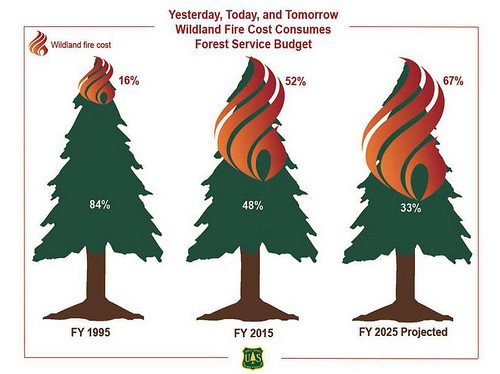A Critical Fix to Funding Our Wildfire Response
Today, President Obama signed into law the Sawtooth National Recreation Area and Jerry Peak Wilderness Additions Act (“Boulder-White Clouds”). This bipartisan bill protects three new wilderness areas over more than 275,000 acres. As he signed this bill into law, the President also called attention to another bipartisan piece of legislation that has yet to be passed: a critical fix to the way we fund our response to wildfires.
In Idaho – where the Boulder-White Clouds bill preserves these important areas – and across the West, firefighters are battling dozens of fierce wildfires. In Alaska alone, wildfires have burned approximately 5 million acres of land. That is about the size of the entire state of Connecticut. And with a changing climate, we know we will have even longer, hotter fire seasons. As Secretary of Agriculture Tom Vilsack recently highlighted in a new USDA report, for the first time ever, the U.S. Forest Service is spending more than half of its budget to suppress wildfires at the cost of mission-critical programs that can help prevent fires in the first place, such as forest restoration and watershed management.

The Administration is committed to ensuring that adequate funds are available to fight wildland fires, protect communities and human lives, and implement appropriate land management activities to improve the resiliency of the Nation’s lands. That is why the President’s Budget proposes to establish a new funding framework for wildland fire suppression, similar to how other natural disasters, like hurricanes, earthquakes, and tornadoes, are currently funded. This approach will ensure that agencies have the ability to restore forests and protect against future fire outbreaks.
The President’s 2016 Budget provides the necessary tools, technical assistance, and on-the-ground partnership to support investment in climate preparedness and resilience. As the President has said before, we need to address the runaway growth of fire suppression at the cost of other critical programs – instead of leaving our agencies and the States scrambling to plug budget gaps while they are literally putting out fires. Like today’s wilderness bill, this is an issue that unites members of both parties. In fact, one of the champions of today’s bill, Representative Simpson, is also one of the champions of legislation that would change the way we fund our response to wildfires, mirroring the Administration’s budget proposal. Congress urgently needs to act and we’re hopeful that the same bipartisan spirit that led to the passage of this important wilderness bill can lead to progress in the way we budget for fire suppression.
Ali Zaidi is the Associate Director for Natural Resources, Energy and Science at the Office of Management and Budget.
White House Blogs
- The White House Blog
- Middle Class Task Force
- Council of Economic Advisers
- Council on Environmental Quality
- Council on Women and Girls
- Office of Intergovernmental Affairs
- Office of Management and Budget
- Office of Public Engagement
- Office of Science & Tech Policy
- Office of Urban Affairs
- Open Government
- Faith and Neighborhood Partnerships
- Social Innovation and Civic Participation
- US Trade Representative
- Office National Drug Control Policy
categories
- AIDS Policy
- Alaska
- Blueprint for an America Built to Last
- Budget
- Civil Rights
- Defense
- Disabilities
- Economy
- Education
- Energy and Environment
- Equal Pay
- Ethics
- Faith Based
- Fiscal Responsibility
- Foreign Policy
- Grab Bag
- Health Care
- Homeland Security
- Immigration
- Innovation Fellows
- Inside the White House
- Middle Class Security
- Open Government
- Poverty
- Rural
- Seniors and Social Security
- Service
- Social Innovation
- State of the Union
- Taxes
- Technology
- Urban Policy
- Veterans
- Violence Prevention
- White House Internships
- Women
- Working Families
- Additional Issues

